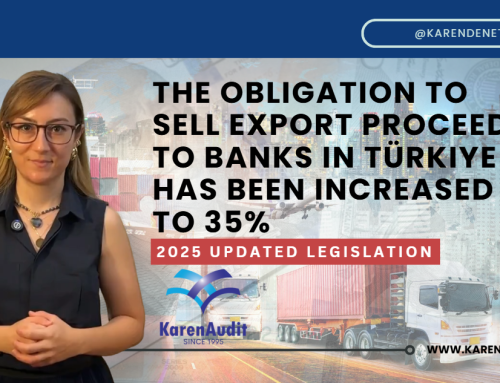The Ministry of Treasury and Finance of the Republic of Türkiye enacted an important change for exporters with its communiqué dated May 2, 2025, numbered 3948630. Effective from Monday, May 5, 2025, the mandatory sale rate of export proceeds to banks has been increased from 25% to 35%.
This regulation will be implemented on a temporary basis until July 31, 2025. The details regarding this change have been clarified through Provisional Article 2 of the Central Bank’s Export Circular.
What Does the New Rate Mean?
Companies in Türkiye that export goods or services and bring the export proceeds into Türkiye must sell at least 35% of the foreign currency amount to the bank that receives the funds. This sale must be made to the Central Bank of the Republic of Türkiye (CBRT) by the bank, using the CBRT’s foreign exchange buying rate applicable on the day of the transaction. The equivalent Turkish Lira amount will then be credited to the exporter’s bank account.
This measure aims to support foreign trade balance and strengthen foreign exchange reserves. It is a critical development to be followed closely by accountants and financial advisors involved in export transactions, foreign currency earning activities, and the issuance of Export Proceeds Acceptance Documents (EXPAD) and Foreign Exchange Purchase Documents (FXPD).
Relevant Legal Provision: Provisional Article 2
“As of the effective date of this article and until (including) July 31, 2025, at least 35% of export proceeds that are subject to an EXPAD or FXPD shall be sold to the bank issuing the respective document. These amounts must be sold by the bank to the Central Bank on the same day at the foreign exchange buying rate announced by the Central Bank, and transferred to the account of the Central Bank held with the relevant bank. The full equivalent in Turkish Lira shall be paid to the exporter by the bank.”
When Does the New Rule Take Effect?
- Start Date: Monday, May 5, 2025
- End Date: Thursday, July 31, 2025 (inclusive)
Who Will Be Affected and Should Monitor This Change?
This regulation directly affects:
- Exporting companies
- Customs brokers
- Accountants and certified public accountants
- Banks
- Audit firms
Key Points to Pay Attention To:
- Exporters receiving foreign currency must sell 35% of the amount to the relevant bank in a timely manner.
- Accounting records must accurately reflect the sale transaction and its Turkish Lira equivalent.
- As this is a temporary practice, new updates after July 31, 2025 should be monitored closely.
- Incorrect or delayed implementation may cause disruptions in the access to export revenues.
Conclusion
The increase of the mandatory foreign currency sale rate to 35% represents a significant change, especially for professionals offering accounting and audit services. Timely and accurate execution of the required transactions will help prevent penalties and delays in the export process.
10 Questions & 10 Answers Summary
- When did the new regulation enter into force?
On Monday, May 5, 2025. - What is the new mandatory sale rate?
35% of export proceeds. - What was the previous rate?
25%. - Until when is this regulation valid?
Until July 31, 2025. - Which foreign currency earnings are covered?
Export proceeds that are subject to an EXPAD or FXPD. - To whom must the foreign currency be sold?
To the receiving bank, which then sells it to the Central Bank. - Which exchange rate is used?
The CBRT’s foreign exchange buying rate valid on the transaction day. - How is the equivalent amount paid?
In Turkish Lira, credited to the exporter’s account. - Who is affected by this regulation?
Exporters, accountants, financial advisors, banks, and audit firms. - What is the most critical point to watch?
The timely and accurate execution of the 35% foreign currency sale.
Legal Notice: The information in this article is intended for information purposes only. It is not intended for professional information purposes specific to a person or an institution. Every institution has different requirements because of its own circumstances even though they bear a resemblance to each other. Consequently, it is your interest to consult on an expert before taking a decision based on information stated in this article and putting into practice. Neither Karen Audit nor related person or institutions are not responsible for any damages or losses that might occur in consequence of the use of the information in this article by private or formal, real or legal person and institutions.






